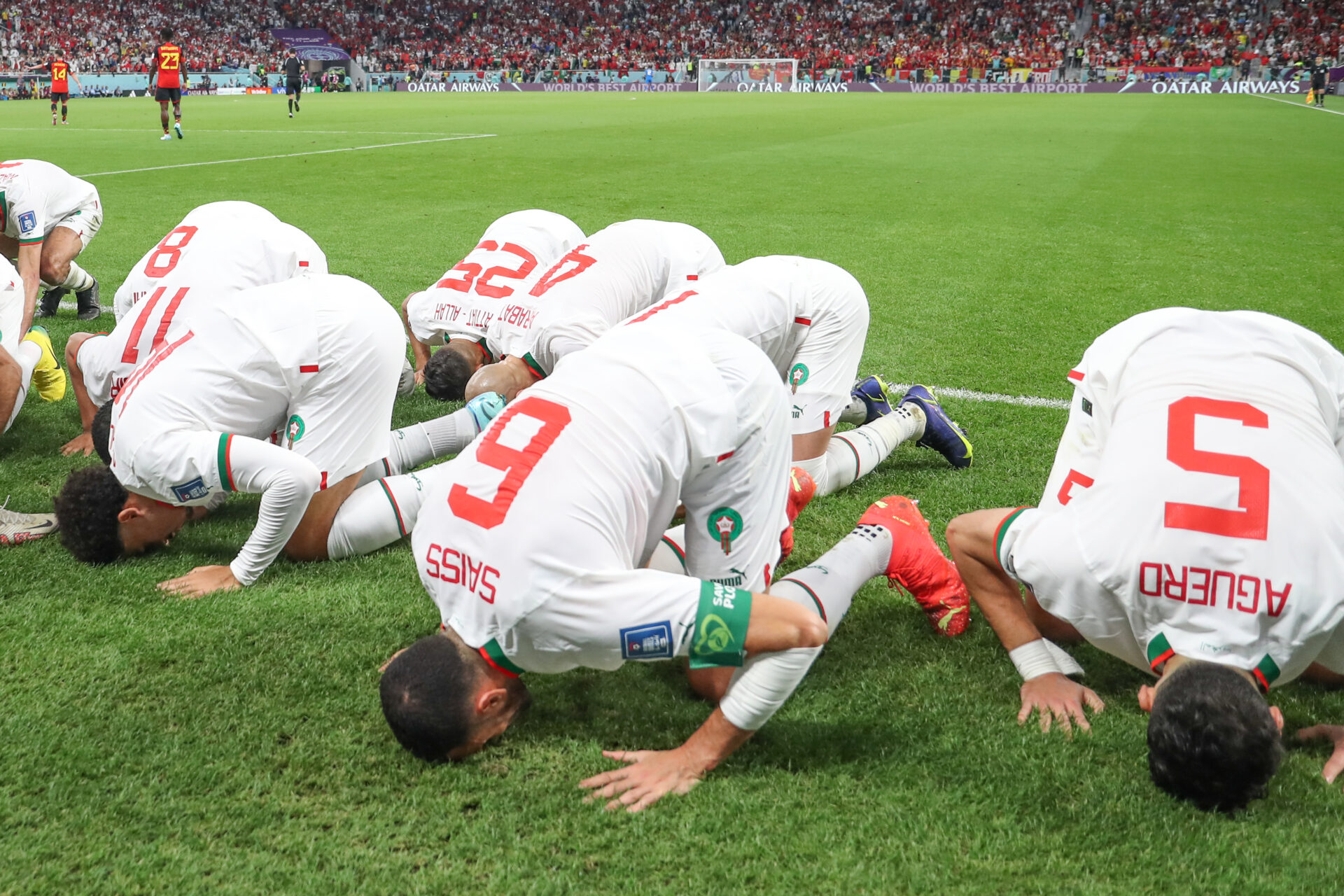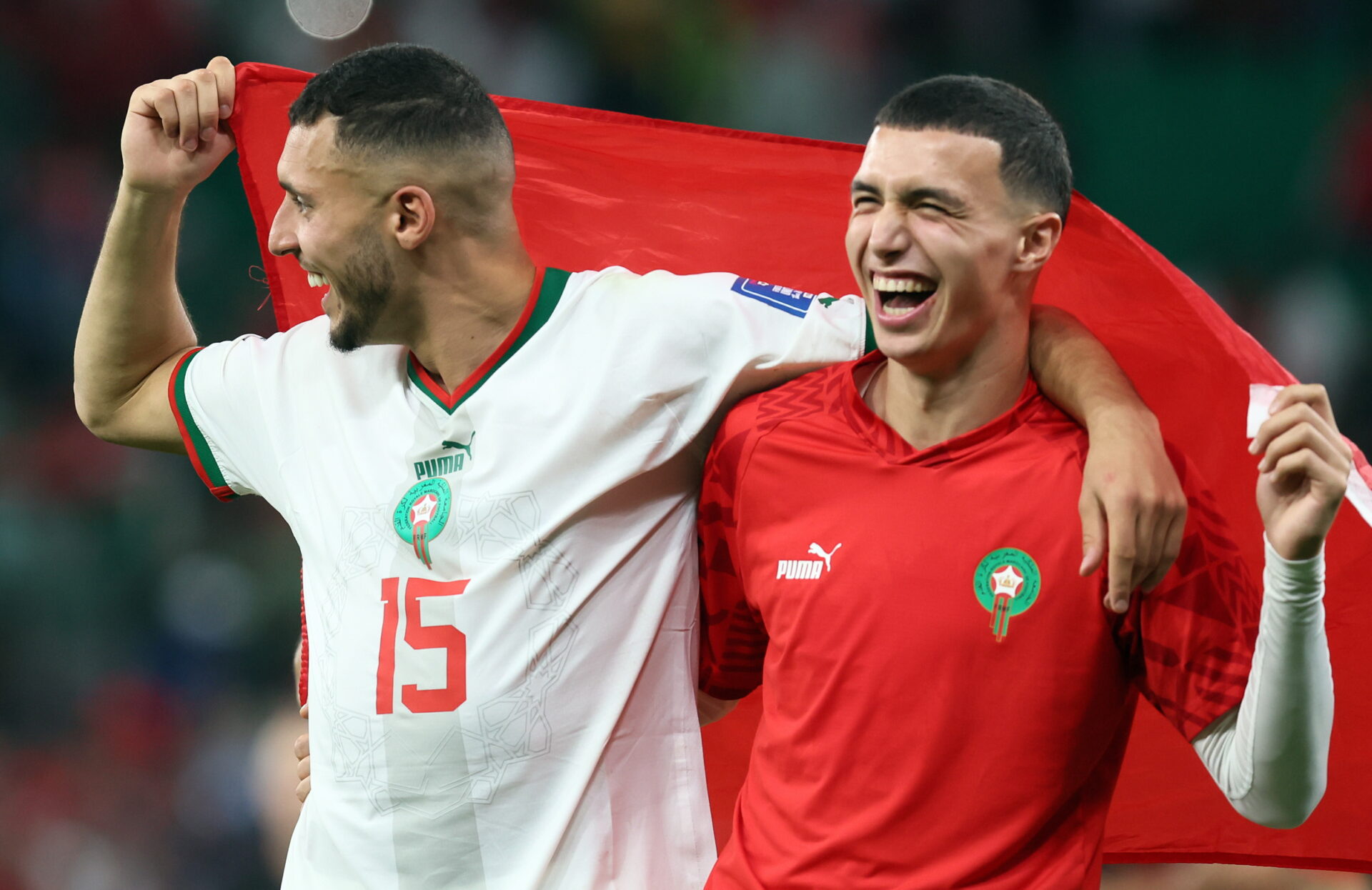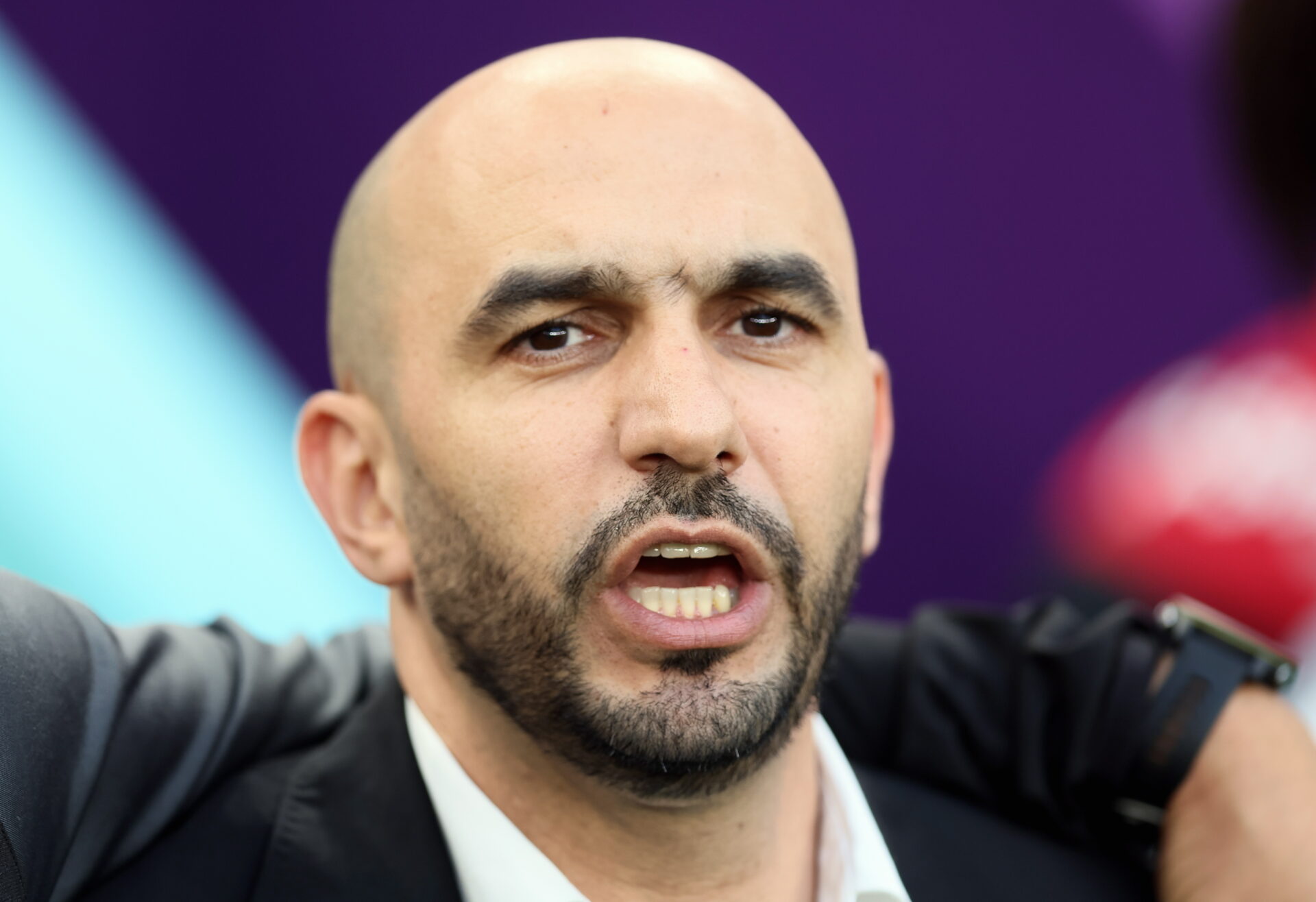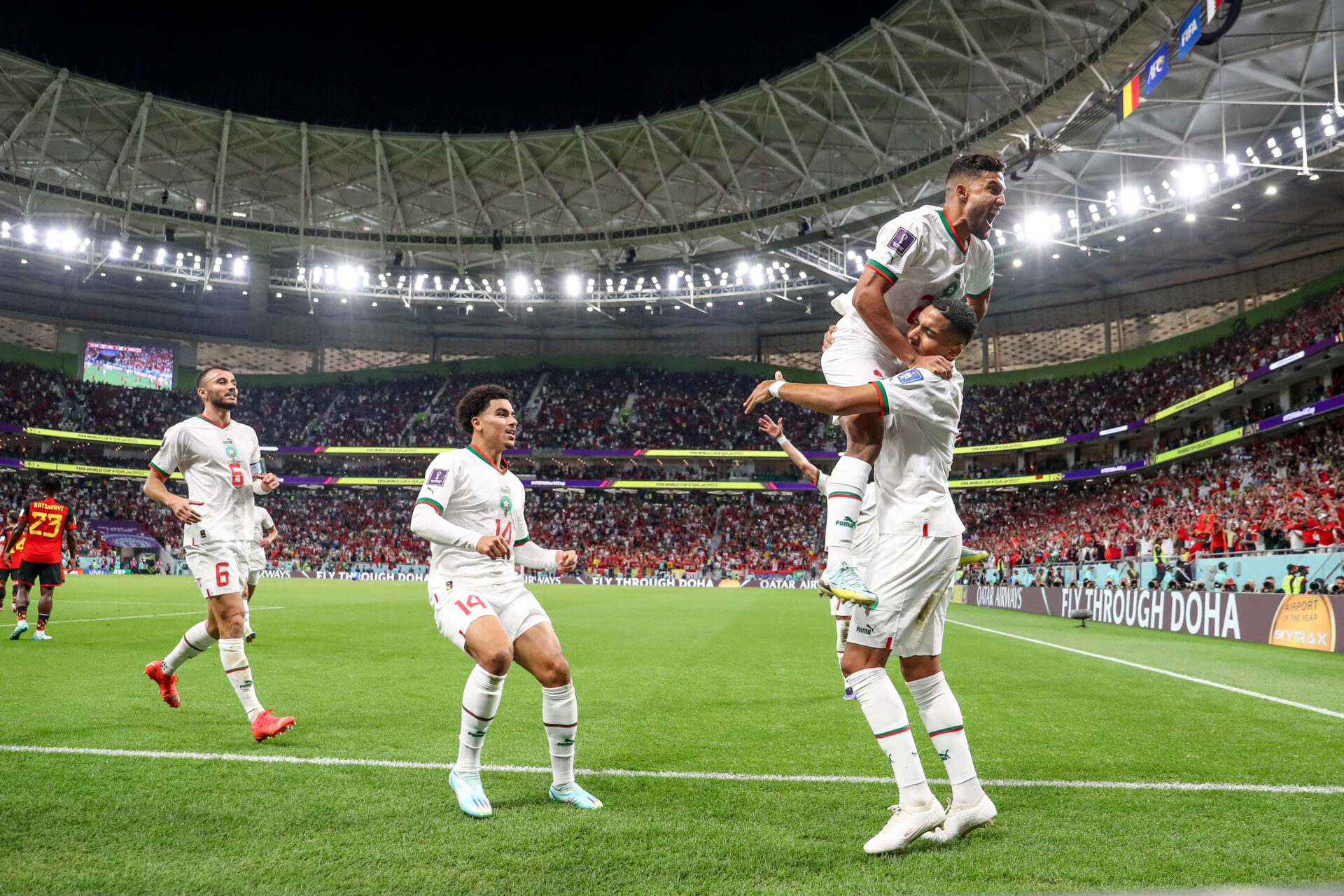In an interview broadcast on French TV on Saturday, Morocco coach Walid Regragui quoted a proverb often associated with former US President John F. Kennedy.
"Defeat is an orphan, but victory has many fathers," Regragui said. "A lot of people want to hoard this victory. But it's the players who did it. Not the coach. No one else. It's the players. Only the players. I just gave them desire and rage."
Kennedy was speaking at a moment of national disaster, after his administration's catastrophic failure to invade Cuba at the Bay of Pigs. Regragui, however, was speaking at a moment of national triumph: his team had just beaten Portugal 1-0 at the Qatar World Cup, thereby becoming the first-ever African team to reach the semi-final of the world's premier football competition.
Towards the end of the interview, Regragui is interrupted by Sofyan Amrabat, a defensive midfielder who has played a key role in Morocco's progression to the tournament's latter stages.

Moroccan players celebrate during a soccer game between Belgium's national team the Red Devils and Morocco, in Group F of the FIFA 2022 World Cup in Al Thumama Stadium, Doha, State of Qatar on Sunday 27 November 2022. Credit: Belga / Bruno Fahy
"Big respect for this guy," Amrabat beamed, speaking in English. "He's with us two or three months. Unbelievable. Big respect."
Regragui, smiling, kisses Amrabat's neck. "Come on!" he cries in English, as they both leave the interview together. "Come on!"
It is this scene, more than any other, which best encapsulates why Morocco, today, stand on the brink of becoming footballing world champions. For it not only demonstrates Regragui's modesty, polished articulation, and general intelligence; it also serves as palpable evidence of the respect and, indeed, love that Regragui has for his players — and, in turn, the respect and love that his players have for him.
A tactical mastermind
In the post-match press conference, Regragui elaborated on one key reason for his team's success.
"I have a clear scheme," the 47-year-old said. "Everyone has to work. [Our success] is not a miracle. Croatia, Belgium, Spain, Portugal: we let in zero goals against all of them. It's not a miracle. It's work."
This work — and, in particular, the immense effort that Morocco's players and staff have put in toward perfecting the team's defensive organisation and shape — is obvious to anyone who has watched even a few minutes of one of their matches at this year's tournament.
Morocco sets itself up in exactly the same formation for each game: 4-1-4-1, with all eleven men typically parked behind the ball when they are out of possession.

Moroccan Selim Amallah celebrates after winning a soccer game between Belgium's national team the Red Devils and Morocco, in Group F of the FIFA 2022 World Cup in Al Thumama Stadium, Doha, State of Qatar on Sunday 27 November 2022. Credit: Belga / Bruno Fahy
Amrabat, who plays as the holding midfielder in this system, plays an especially important role: his interceptions, tackles, and general shielding of Morocco's defensive line has unquestionably made him one of the tournament's stand-out performers — and has also reportedly sparked the interest of several prestigious Premier League clubs.
Such has been Morocco's ability out of possession that, incredibly, the only team to have scored against them at the World Cup is (literally) themselves — more specifically, when defender Nayef Aguerd accidentally slid the ball into his own team's net during Morocco's final group game against Canada. (Morocco went on to win the match 2-1.)
Indeed, such has been the resilience of Morocco's defensive organisation that their five opponents have had a sum total of just nine shots on target against them at this year's tournament. For comparison, England had eight shots on target over the course of their 2-1 quarter-final defeat to France: Morocco's semi-final opponents, whom they play on Wednesday evening.
Quality on the ball
Morocco's defensive organisation, however, is not the only secret to their success. Another, crucial — and, upon reflection, obvious — factor is the actual calibre of their players. Indeed, Morocco boasts a number of elite footballers within its ranks, including (but not limited to) Paris Saint-Germain's Achraf Hakimi, Bayern Munich's Noussair Mazraoui, and Chelsea's Hakim Ziyech.
"Everyone thought we were going to be knocked out in the first round," Regragui explains. But we have players in the top clubs and we have a team that can win games at the World Cup and that's what I tried to get through to my players. We need to be confident and we need to go out there and give everything and have no regrets — and they believed me."

Moroccan head coach Walid Regragui reacts during a football game between Belgium's national team the Red Devils and Morocco, in Group F of the FIFA 2022 World Cup in Al Thumama Stadium, Doha, State of Qatar on Sunday 27 November 2022. Credit: Bruno Fahy / Belga
Morocco's attacking game is based predominantly around the fact that, although they spend the vast majority of the game without the ball, when they break, they break with quality and pace — as well as numbers.
This system, however, also requires that attacking players like Ziyech and Sofiane Boufal must run much more than they are accustomed to at club level. But, as Regragui is careful to emphasise, this is something that they are only too happy to do.
"If you see Hakim [Ziyech], if you seen Bouffal: I don't think they’ve ever run as much in their lives," Regragui said after his team's quarter-final victory. "But they do it naturally. They do it for their country."
A team united
This last quote, in turn, naturally leads to the final key reason for Morocco's success: namely, the sense of togetherness, camaraderie and even patriotism that Regragui has been able to foster among his players.
The fact that this latter quality is so clearly prevalent within the team is perhaps somewhat surprising, given that many of Morocco's players were not born nor have ever lived in Morocco. Indeed, some —including Boufal — do not even speak Arabic.
Related News
- How Morocco fans in Brussels have (really) celebrated their World Cup campaign
- Belgium in Brief: A reflection of raw Moroccan reality
One plausible reason why Regragui has been so successful in generating this sense of national identity is because he, too, is a member of Morocco's 5-million-strong diaspora. (Regragui was born and raised in France.) But another core factor is, unquestionably, his personality — and in particular Regragui's clear, almost tangible love for and total commitment to his players.
Indeed, it is this latter fact, more than any other, which best explains why Morocco really could end up this tournament's winners.
"We're showing the world what's possible in life," Regragui said in the post-match press conference. "You can have less talent, less quality, you can have less money. But if you want it, if you work, if you fight, if you believe, then you can do it."

